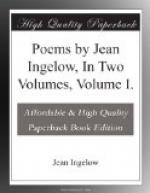While thus I went to gladness fain,
I had but walked a mile or twain
Before my heart woke up again,
As dreaming she had slept too late;
The morning freshness that she viewed
With her own meanings she endued,
And touched with her solicitude
The natures she did meditate.
“If quiet is, for it I wait;
To it, ah! let me wed my fate,
And, like a sad wife, supplicate
My roving lord no more to flee;
If leisure is—but, ah! ’tis not—
’Tis long past praying for, God wot;
The fashion of it men forgot,
About the age of chivalry.
“Sweet is the leisure of the bird;
She craves no time for work deferred;
Her wings are not to aching stirred
Providing for her helpless ones.
Fair is the leisure of the wheat;
All night the damps about it fleet;
All day it basketh in the heat,
And grows, and whispers orisons.
“Grand is the leisure of the earth;
She gives her happy myriads birth,
And after harvest fears not dearth,
But goes to sleep in snow-wreaths dim.
Dread is the leisure up above
The while He sits whose name is Love,
And waits, as Noah did, for the dove,
To wit if she would fly to him.
“He waits for us, while, houseless things,
We beat about with bruised wings
On the dark floods and water-springs,
The ruined world, the desolate sea;
With open windows from the prime
All night, all day, He waits sublime,
Until the fulness of the time
Decreed from His eternity.
“Where is OUR leisure?—give us rest.
Where is the quiet we possessed?
We must have had it once—were blest
With peace whose phantoms yet entice.
Sorely the mother of mankind
Longed for the garden left behind;
For we prove yet some yearnings blind
Inherited from Paradise.”
“Hold, heart!” I cried; “for trouble
sleeps;
I hear no sound of aught that weeps;
I will not look into thy deeps—
I am afraid, I am afraid!”
“Afraid!” she saith; “and yet ’tis
true
That what man dreads he still should view—
Should do the thing he fears to do,
And storm the ghosts in ambuscade.”
“What good?” I sigh. “Was reason
meant
To straighten branches that are bent,
Or soothe an ancient discontent,
The instinct of a race dethroned?
Ah! doubly should that instinct go
Must the four rivers cease to flow,
Nor yield those rumors sweet and low
Wherewith man’s life is undertoned.”
“Yet had I but the past,” she cries,
“And it was lost, I would arise
And comfort me some other wise.
But more than loss about me clings:
I am but restless with my race;
The whispers from a heavenly place,
Once dropped among us, seem to chase
Rest with their prophet-visitings.
“The race is like a child, as yet
Too young for all things to be set
Plainly before him with no let
Or hindrance meet for his degree;
But nevertheless by much too old
Not to perceive that men withhold
More of the story than is told,
And so infer a mystery.




